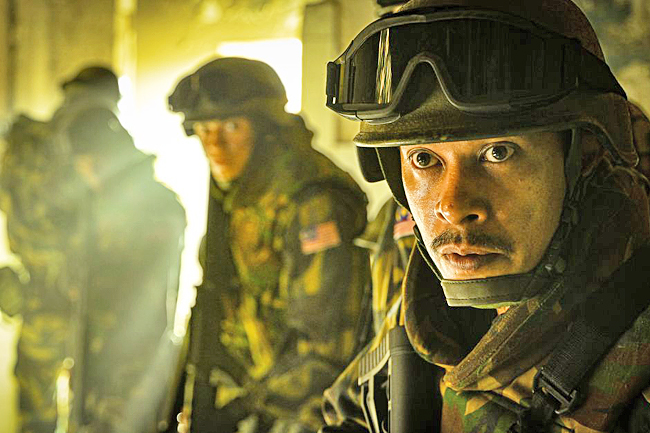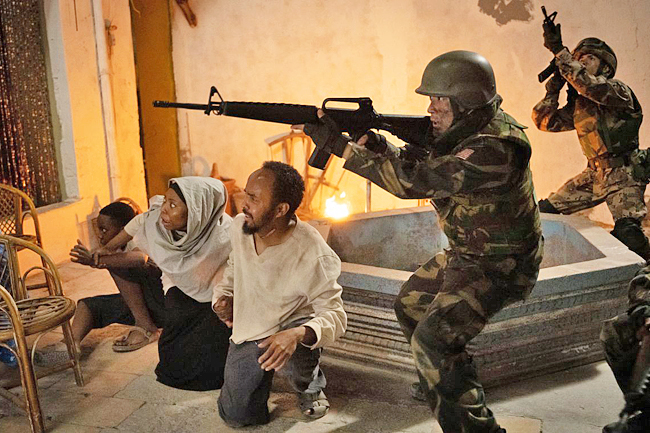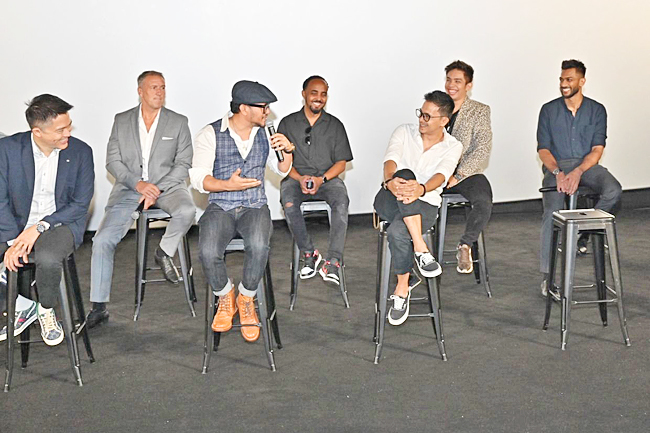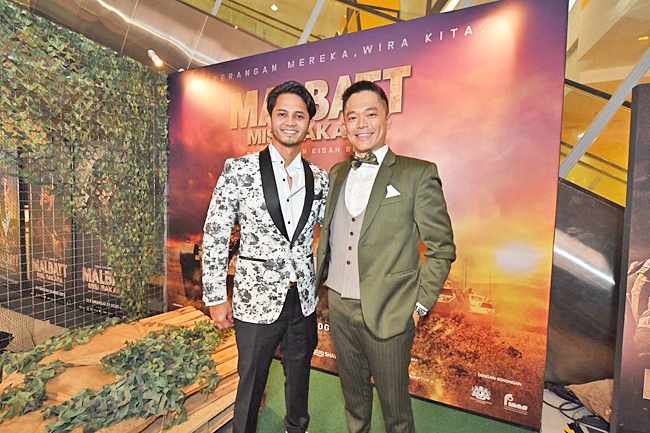ANN/THE STAR – At the age of 17, Adrian Teh’s initial exposure to the 2001 film Black Hawk Down left a lasting impression.
Despite his strong affinity for the war movie, he remained unaware of the Malaysian Armed Forces’ participation in the actual events portrayed in Ridley Scott’s film, as this crucial detail was notably omitted.
“There was just one mention that I noticed when I watched the movie again later. And nothing else,” said the 39-year-old director during a press meet recently.
The truth is, the incident – on October 3-4, 1993 – saw the Malaysian Battalion (or Malbatt) participating in the mission alongside the United States (US) and Pakistani military forces at Mogadishu, Somalia.
On that date, 30 years ago, they had set out to rescue a group of American soldiers who were caught behind enemy lines at the Bakara market after their Black Hawk helicopters were shot down by Somali militia.
The highly volatile area was heavily guarded by rebels, making the rescue next to impossible.
But Malaysian soldiers persevered and the mission was a success.
Teh said he got to know the real story back in 2018 through casual conversations with members of the army whom he befriended while making the box-office hit Paskal: The Movie.
“The more I dug into what really happened that night, the angrier I got. Why wasn’t the Malaysian Army given the acknowledgement in Black Hawk Down when its contribution was huge?” he asked.




A total of 114 Malaysian Armed Forces personnel were involved in the United Nations (UN) peacekeeping effort in Somalia in the 1990s.
The Bakara mission itself resulted in one Malaysian soldier killed while in action and nine others injured.
But the US never officially acknowledged the role of Malaysian soldiers in this rescue mission.
It was only in 2013, 20 years later, that the US thanked Malaysia, stating that “Malaysian peacekeepers had proven their mettle and prowess in performing their duties under the UN banner”.
Teh said, “I felt I needed to tell this story from the Malaysian soldiers’ perspective… to tell everyone just how great our army is, and all the men serving in it.”
Five years on, Teh is excited Malbatt: Misi Bakara is finally hitting the cinemas in Malaysia.
It features top notch actors like Zahiril Adzim, Iedil Dzuhrie Alaudin, Shaheizy Sam and Hairul Azreen, to name a few, and lots of tense action sequences including firefights and explosions. Malbatt is also the first Malaysian film to be released in IMAX cinema.
“This is one of the greatest, if not the greatest, war story of our lifetime. It is my honour to tell this story,” added Teh.
Wanting to ensure the story remained true to what occurred, Teh – who co-wrote the screenplay with Ashraf Modee Zain – went to great lengths to get everything right.
This included reading through military reports, talking to the soldiers involved – some of whom are still alive – and coming up with more than 400 pages of storyboard.
According to Teh, 90 per cent of what is seen in the movie is based on what actually happened, including some of the dialogue.
“The script probably took me three years to complete because it was important that every soldier’s contribution and sacrifices are told respectfully and properly,” said Teh, adding that he decided to use fictional names for the characters as he wanted to remain respectful of the actual people.
His team also had to reproduce the uniforms worn by the Malaysian, the US and Pakistani soldiers for the film, not to mention to reconstruct weapons used back in 1993 as well as the army vehicles featured in the movie, including the armoured personnel carrier (APC) utilised in Mogadishu.
“All these have become obsolete now, so we had to recreate them from scratch,” said Teh of the effort, resulting in Malbatt becoming one of the most expensive movies produced in Malaysia with a MYR20-million budget.
At the same time, Teh and his cast acknowledged that none of it would’ve been possible without the full cooperation and approval from the Malaysian Armed Forces.
Actor Iedil said, “We had military training, right before the shoot. We were sent to a camp in Port Dickson where they brought out all the APCs, guns and equipment which they have kept from back then for us to familiarise with.
“So, we are thankful to the Malaysian Army for sharing all these assets with us.”
The 39-year-old star added that the training also helped in forming that brotherhood bond – an important element in the army.
“I knew most of the actors even before shooting this film.
“But being together during training and later filming in Turkiye, our bond just got stronger, which is key in playing soldiers.”
To further enhance the accuracy of the event on film, Teh hired Paul Biddiss – who had been with the British Army for 24 years, then a bodyguard and a private investigator before becoming one of the top military advisors in Hollywood.
Among Biddis’ credits are Sam Mendes’ war movie 1917, and Scott’s films Napoleon and Gladiator 2.
On set in Turkiye – which is the stand-in for Somalia in Malbatt – the cast members went through another round of military training with Biddis. The 55-year-old Englishman, who was also at the recent press event, said, “As far as military training is concerned, I am teaching most guys who have never even touched weapons. The first thing I teach them is weapon safety and then how to handle weapons, hold weapons and stand like soldiers.
“The training took me about two weeks altogether to get the guys from A to B, where I felt it was safe.”
According to actor Zahiril, this was the first time he was acting in a role requiring him to handle rifles.
“We had training before flying to Turkiye to shoot the film. But, it was good that Paul was there to correct us on set. I always got corrected in the way I was holding the gun.
“But I loved it as I felt I was picking up a new skill as an actor. Now, I can even tell if an actor in a film I’m watching is holding his gun properly or not.”
Some other actors, like Shaheizy, who has had gun training for his Polis Evo films, said that he had to relearn how to handle rifles as it was totally different in 1993.
“Development in weapons technology is fast, so how we hold it today is different than in 1993. Paul would tell me that this wasn’t how it was done in the 1990s. It was a matter of getting comfortable with the rifle,” said Shaheizy.
According to Biddis, everyone was receptive to the military training. “They worked hard and produced the goods all around.”
Unexpectedly, too, Iedil pointed out another challenge.
“The hardest thing for me was the fact that we were transported to years ago.
“It’s not just about the training because I have done action films before, but all the references, like the kind of songs that the guys were listening to and the events of that era, we really needed to know all this to transport ourselves back to that time,” Iedil said.
When StarLifestyle asked Biddis why he wanted to participate in Malbatt, the former soldier said, “This is a story that needs to be told. There’s a lot of stories that are untold in history.
And this is a story that had to be told, which is why I wanted to be part of this.
“What you don’t want is, to create a bad impression to be given on both sides.
“So, my role was to advise Adrian and the cast on how best to project the nations as a team to get out of a sticky situation… because when you’re in a firefight, all of a sudden, nations become blurred, you are now part of the same team. I wanted to help show that as well.”
Similarly, Somali American actor Musa Aden, 33, was keen to be in Malbatt as the film also tells the story of the people of Somalia who were caught in that violent civil war. “I was born in Bakara, which is why I wanted to be in this movie,” said Aden. “Nobody talks about Bakara, nobody ever shows a good person in Somalia. When they sent me the script, I really fell in love with the story.”
Aden plays Abdalle in Malbatt, an interpreter who puts his life in danger as he helps the UN in its peace mission. Abdalle then strikes a close friendship with one of the Malaysian soldiers and that very friendship is put through an emotional test as they face life-and-death situations during the mission.
Teh said that the friendship and scenes involving Abdalle are the only parts in the movie that he took the most creative license with.
“Other than portraying how good the Malaysian soldiers were, and how the Malbatt team was a success in Mogadishu, I wanted to put out another message,” Teh said.
The filmmaker added that, through Abdalle, he wanted to create an awareness that it was the common people of Somalia who suffered the greatest loss.
“Besides how many American soldiers died or got injured, and how many Malaysians were affected, I wanted to bring out the point that there’s someone else who was worse off – the people of Somalia,” Teh reiterated.
Aden agreed, “You have no idea how important this movie is. I cannot wait for people to watch it.
“The reason I’m saying this is because, in the news, all people see is terrorism. But Somalis, they protect each other more than anything.
“They don’t want to die, they don’t want other people to die. But the Somalis’ side of the story is never told.
“Instead of just showing one side, why not show both sides, no matter how ugly it is?” asked Aden, who can be seen in Apple TV+ anthology Little America.
“So, I hope this film is shown everywhere and it changes how people perceive others – not only Somalis but people of any other country.
“I hope (in the future) films show both sides of the story because that is only fair.” – Mumtaj Begum


